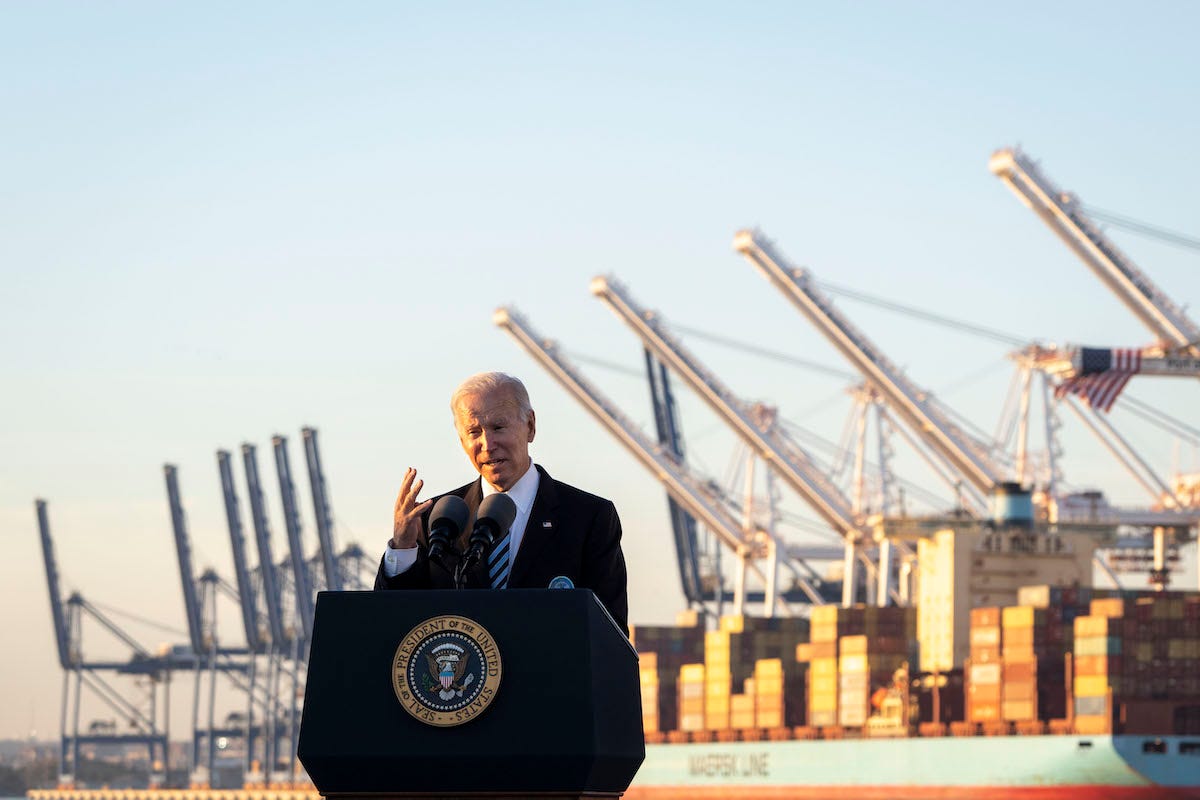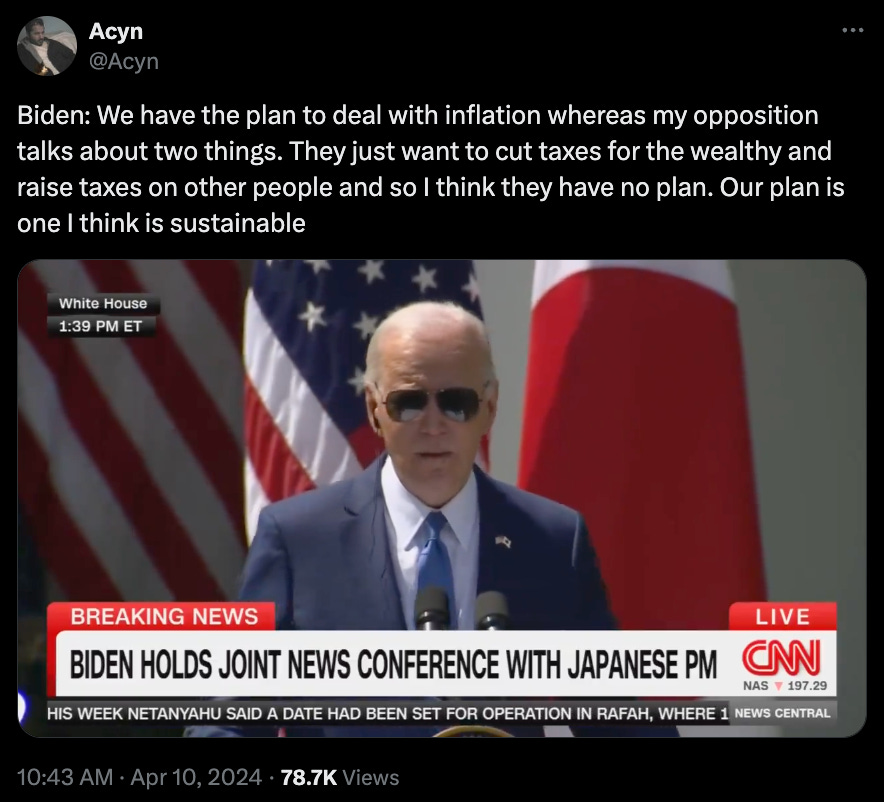The Political Effects Of Policy Stem From Vibes, Too
The way issues code as red or blue often hurts Democrats, but there's more they can do to help people understand material reality
Steve Bannon let on to something interesting this week. As Greg Sargent first noticed, Bannon acknowledged that oil production under President Biden has reached historic highs. But he implied that this empirical reality is less important than how and whether the factual information is deployed. It’s not that Republican elites don’t know Biden has overseen an oil-production bonanza—it’s that they don’t feel any moral obligation to acknowledge the truth unless it’s useful to them. To that end, Republicans will try to filter the truth about Biden’s broad-spectrum energy boom to a subset of progressives who will find this facet of Biden’s legacy disaffecting. But in every other context, Bannon and other Republicans will simply pretend to believe Biden’s left us at the mercy of foreign oil states.
Among other things this kind of admission—which is nothing new for Bannon—should help settle the debate over how knowing Republicans are when they spread lies or hide truths in pursuit of power. How should responsible journalists cover Republicans when they say false things about Biden’s record, given all the reasons we have to believe they know the truth?
But I want to focus for now on the informational problem this creates for Democrats. In addition to raising the question of how Democrats should parry when confronted with conniving deception, it represents a frontal challenge to the liberal view of politics, where what leaders deliver matters most to how voters perceive them.
What if perceptions instead attach to politicians first, and those perceptions color issue opinion: whether a policy good, what it does, and who’s responsible for it?
CODE RED, CODE BLUE
I tried to get at this a bit on this week’s episode of Politix.
The centerpiece of Donald Trump’s fiscal agenda is a 10 percent sales-tax increase on just about every product Americans buy. If you’re mad about sticker prices under Biden, rest assured Trump’s sales tax will increase them substantially. And that’s before we factor in the inflationary effects of his plans to crackdown on immigration, and give extremely rich people another tax cut.
To this point, though, Trump has not suffered political blowback for embracing ideas with toxic consequences. And that’s because he doesn’t call his plan a “sales tax.” He calls it “across the board tariffs.” And to the extent Americans know what tariffs are, they think of them as protectionist and vaguely patriotic—necessary, perhaps, to protect American factory workers from cheap foreign competition.
In certain contexts a tariff might serve those purposes. An impost on all foreign goods, by contrast, would just look like an across-the-board price increase. But absent pushback, Trump can clothe his regressive agenda in populist jargon and most people will be unable to see beyond the artifice. Trump bad mouths China a lot, after all. He attacks immigrants for sport, and he talks about “America” and workers a lot. Why wouldn’t non-experts view his tariff promise in that light instead of as one slice of a Let Them Eat Cake agenda: favors for the Republican donor class paid for by the rest of us?
Where Trump may benefit from a vibes-based perception of policy substance, Democrats frequently suffer, because voters impute their perceptions of progressivism on to the party agenda. Bannon’s day job is to lie and fan propaganda—flood the zone with shit—but his implicit insight is that voters won’t give Biden credit for cheap energy, because they view Democrats as the party of climate change and pollution taxes: They’re the ones with environmentalists in their coalition, Bannon reasons. We can demoralize those environmentalists by micro-targeting them with the facts about Biden’s record, but the rest of the country will simply assume Biden, as a Democrat, has been consistently hostile to fossil fuels.
This dynamic repeats itself across many major issue spaces, because Democrats are associated with a wide variety of causes. Democrats still comprise a logroll of interest groups. They are understandably identified as the hub of a coalition that includes environmentalists and social-spending advocates and social-justice reformers, often easily caricatured.
Biden hasn’t measurably helped his cause by funding police and presiding over a steep drop-off from Trump-era highs in violent crime, because Republicans are coded as the party that cracks down on minorities and inner city criminals. Cops love Republicans! Meanwhile, alongside their pro-cop budgets, Democrats have embraced the cause of police accountability. Some of their activists proposed defunding the police. The actual state of public-safety thus appears to have little impact on whether voters view Democrats or Republicans as the better crime fighters.
Inflation, deficits, the economy? Same, same, same. Through a mix of luck and determination, American economies have been stronger and deficits lower under Democratic presidents than Republican presidents. This has become predictable, like clockwork, over decades. By all rights, when you ask voters which party would best steward the economy, Democrats should win out 100-0.
Instead, they run consistently behind, because the other party strives to give capitalists free rein and claims credit for every economic milestone the country passes. Democrats build and try to protect the safety net. They propose taxing rich people to underwrite social-insurance programs. They want to regulate predatory corporations that might poison the air and water, or employ children in dangerous jobs, or fleece consumers of financial-products.
And so, with unemployment at historic lows, wages outpacing inflation, and the U.S. economy, rescued from COVID, now the envy of the world, Trump outpolls Biden on the economy by large margins.
SCHOOL OF SQUISH
There’s a school of thought in progressive politics which holds that Democrats should freely take big political risks and advance transformative policy ideas because Republicans will caricature them as woke, god-hating socialists no matter what they do.
I sympathize with the instinct, and of course detest the opposing school of thought whereby Dems must trim their sails out of political expedience by default. But it’s not a very sound heuristic. Democrats may not need to become immigration restrictionists to beat back Republican smears, but Republican lies would travel much farther if Democrats really did support open borders. Republicans will call every Democratic policy proposal “socialist,” but that neither implies that they should absorb the Libertarian Party’s regulatory agenda nor that it’d be a political wash to nominate a self-identified socialist for president. It’s harder to sustain an outright lie than it is to convince the masses of something at least vaguely true.
We can see this quite clearly as Republicans try to wriggle away from their abortion bans. The more true they remain to their anti-abortion principles, the worse things get for them politically. The more they grasp for the center—that is, the more they lie about their agenda—the more persuasion work Democrats must do.
Unfortunately for Democrats, this model of public opinion has them underwater in issue polling even where their records are quantitatively superior. Abortion and health care are two big exceptions to the rule.
But unlike Trump, who will try to shake off his liabilities through mass deception, Democrats and liberals don’t have to lie about taking crime seriously, or being fiscally responsible, or being sensitive to both energy prices and the environment. They just have the (sadly much more difficult) task of convincing people to stop viewing issues through the prism of vibes and to grapple instead with what conditions in the real world look like—before Fox News producers and TikTok creators warp them beyond recognition.
One part of it in my mind is abandoning their penchant for excessive generosity. Not to veer all the way into lying and bad faith, but to gain comfort with making reasonable inferences when social scientists and policy analysts don’t have real answers.
Paul Krugman is no wilting violet, but even he absolved Trump for overseeing a spike in violent crime.
I mean… are we sure he didn’t cause it? Was it really all COVID-19? And police backlash to the George Floyd protests? COVID was a global phenomenon. The Floyd protests were, too, though obviously less so. Why was what happened during Trump’s one term so unique to the United States? Is it not conceivable that his constant antagonism and abuse and picking at scabs and contempt for rules and laws made many people angrier? More reactive? More convinced of their own impunity?
It seems pretty intuitive to me that Trump bears a great deal of responsibility for the Trump crime wave—intuitive enough that politicians should feel free to simply level the accusation.
In a similar vein, I’ve encouraged Biden to treat inflation (if he must invoke it at all) as part of the difficult process of rebuilding the economy that Trump wrecked, rather than as a global problem that he solved. If Democrats want voters to hear the words “Republican” and “Trump” and associate them with economic collapse, and all the dislocation it causes, they need to blame them for the very real catastrophes their policies have wrought.
Another part is deft communication. Biden did a decent job this week of recasting Trump’s economic agenda—not tariffs on foreign goods, but taxes on working people.
It’s a start. But it’s also a big project, and I doubt it can be accomplished without more sweeping storytelling.
Barack Obama did a good job ahead of his re-election of convincing voters to reserve their anger for the authors of the collapse (Republicans) not for those taking on the challenge of rebuilding (Democrats). With an Obama-like rhetorical touch, it’d be much easier to convince voters that Republicans have ginned up a series of false choices. It’s either renewable energy or Drill, Baby, Drill. It’s either cops run amok, or rampant crime. It’s either clean air or the day-to-day comforts of climate control, open roads, and air travel.
In Biden’s America, though, oil production is up, while emissions are down. Police still face scrutiny, but murder is falling. Taxes and spending created jobs and increased wages. Republicans want you to see the world in zero-sum terms because they think it’s a skeleton-key to power. But that’s just another lie alongside so many others. And we’ll all discover it the hard way if Republicans consolidate power, prices increase, rich people get richer, the air and water darken, the federal government bans abortion, security services turn into partisan enforcers, and American democracy dies.





That…took a turn there at the end. But yes. I am itching to deliver a copy of the bipartisan, Senate approved National Security Act to my neighbor with the “Close the borders, Joe” sign in his yard. But I’m too afraid of being shot at if I try.
People don't trust real facts anymore because propaganda and truth get equal treatment in the media. Sounds like Brian wants Democrats to not be so strict in their fidelity to "unbiased" facts. Maybe "facts" aren't always the same as the truth and can be reinterpreted a little. There's always partisan spin. Dems could get better at it. I have no problem with this. But will it help much with the both sides media? The vibes based journalism of click bait headlines? It's a big problem, and won't be solved in a cycle.